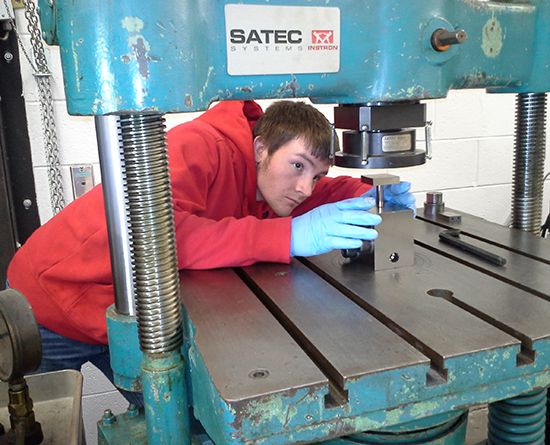Penn State-DuBois and Symmco fabricate lightweight copper-based alloy with high power density desired by automakers
Nathan Snizaski
Aug 18, 2023
Powder metallurgy (PM) is one of Pennsylvania’s top manufacturing sectors, with many PM companies specializing in iron-based parts for automotive applications. As annual sales increase for electric vehicles (EVs), there has been a decline in iron powder shipments for parts and vehicle sales. EV automakers favor copper-based components to meet performance and efficiency standards. Penn State-DuBois and Symmco fabricated a lightweight copper-based alloy with high power density to help the PM industry keep pace with the acceleration of EV adoption.
“From an electrical properties point of view, iron-based materials are inferior and not favorable in the transition to electric vehicles,” says Daudi Waryoba, associate professor of engineering at Penn State-DuBois. “However, copper-based parts possess exceptional electrical properties, which is ideal for performance and efficiency.”
Beryllium copper is preferred in automotive manufacturing due to its high strength, resilience, and elastic properties. However, beryllium is a toxic material and is increasingly discouraged from use. Waryoba and industry partner Symmco (Sykesville, PA) identified an industry need for a safer alternative desired by EV automakers.

The team investigated a copper nickel silicon alloy as a promising solution because it can withstand precipitation strengthening–a heating technique that adds exceptionally tiny particles, known as precipitates, to the alloy during fabrication to increase strength and durability. Waryoba foresees a bright future for the entire automotive industry if copper nickel silicon parts can be fabricated using PM rather than through melting and casting.
“Our motivation for the project is to fabricate copper nickel silicon using powder metallurgy to help the PM industry from falling behind,” says Waryoba. “The process is very efficient. We can produce parts into what we call ‘near net shape,’ allowing you to fabricate components very close to design specifications and minimize most subtractive processes, like machining.”
Symmco is a leading manufacturer of copper-based products with a history of engagement with nearby Penn State-DuBois. Materials engineering manager Andrew Serafini said the company was excited to work with Penn State students again on another project.
“Production scale is always a little different than lab scale testing, so we got involved in supporting the project with equipment and supplies,” says Serafini. “Our company wants to give back and connect with our community—certainly with Penn State-DuBois—so we were glad to work with them again on another project.”
Symmco benefitted from having access to Penn State-DuBois students involved in the project. Some students were extended internship offers to continue their relationship with the company during summer semesters. The company hired Tyler Stitt as an intern to prepare powders needed for the project and optimize Symmco’s press for testing.
Working with (Penn State-DuBois alum) Tyler Stitt and Penn State-DuBois was easily managed back and forth from both ends. Everything moved very smoothly. As the project wrapped up, we hired Tyler full-time, which was a great opportunity for him and for us.
Andrew Serafini, Materials Engineering Manager, Symmco
“Working with Tyler and Penn State-DuBois was easily managed back and forth from both ends,” says Serafini. “Everything moved very smoothly. As the project wrapped up, we hired Tyler full-time, which was a great opportunity for him and for us.”
Waryoba credits the Manufacturing PA Innovation Program for facilitating unique partnerships between Pennsylvania academics and industry partners. He believes that the partnerships may not only lead to better parts and performance but also workforce development and employment opportunities for students.
“As a faculty member, whenever your students excel and become employed, there is so much excitement to see them progressing in their careers and professions,” says Waryoba. “In the same way, I’m always happy and excited when I see projects and products eventually becoming commercialized and taken to the next level. After all the hours spent with students in the lab doing research, we can finally see the technology being adopted by industries. That’s what drives us.”